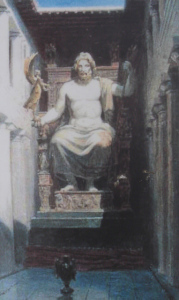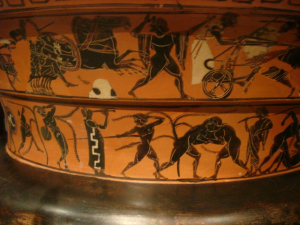S.Q. Eries's Blog, page 70
February 23, 2012
Book Review: Reel Cuisine

It's Oscars week! So it's fitting that I post a film-related book review. Vertical recently released the English language version of Reel Cuisine, a cookbook written by a Japanese film stylist, whose recipes are inspired by movie scenes.
Back Cover Blurb
Professional food stylist Nami Iijima has worked on the sets of more than a dozen international films and TV programs. Her dishes have inspired hunger across the globe. The Finnish/Japanese co-production "Seagull Diner" was partially inspired by her scrumptious and worldly dishes.
Packaging
This being a book by a film food stylist, its strongest point is the photographs that accompany the recipes. They're not just shot in appealing manner; each dish is presented in a way that re-creates the feel of the cinematic scene that inspired it.
Unfortunately, the format Vertical chose to release the book isn't ideal for the content. It's a small paperback so it's not impressive to be a coffee-table book, and the binding is on the flimsy side for a cookbook. Cookbooks are typically sturdier stuff, made to withstand being propped open multiple times on the kitchen counter. This little book would not be up to that task; I was only part way through my first read when a couple pages detached from the spine.
The Review
This is the first Vertical cookbook I've reviewed. When I read its summary blurb, I wasn't sure what to expect. Now having read it, I'm uncertain what American audience it would appeal to.
The author is Nami Iijima, a Japanese film food stylist. This book is an offshoot of her newsmagazine column "Reel Cuisine," in which her goal is to "faithfully recreate the dishes shown in various films" in a way that is "easy and accessible, even for people who … aren't so confident in the kitchen." This English-language edition contains seventy recipes, each of which includes a brief summary of the film that inspired it and a photograph of the completed dish. Thanks to the prevalence of Hollywood films, Americans will recognize most of the movies referenced. The book also includes four pages entitled "Work Diary," in which Iijima-sensei gives a glimpse into her life as a film food stylist; two pages of her favorite quotes and scenes; and an index of recipes.
The book gets points for eye-candy (the cactus plate for "Green Salad" is pretty cool), but it doesn't quite accomplish the goal of "easy and accessible." This is primarily due to the fact that Iijima-sensei was writing for a Japanese audience. Vertical does provide measurements in US standards as well as metric, but her choices for ingredients are based off products commonly available in Japanese stores. For instance, her recipes call for "cake flour" and "bread flour" but no mention is made of "all-purpose flour." For "Burritos," the recipe includes instructions for making tortillas out of bread flour and butter, whereas an American version would probably instruct you to purchase tortillas at the store.
Many recipes are for Western dishes, but several distinctly Japanese foods which will require access to an Asian grocery store are also on the list. In addition, some of those dishes require a certain amount of cultural familiarity. If you don't know what "Sukiyaki" is and how it's eaten, you could get confused by that particular recipe. Ingredients for the "Iced Azuki" include "classic syrup," and I still haven't figured out what that is. (Simple syrup? Maple syrup?)
Iijima-sensei includes helpful preparation notes for some recipes, but all instructions are text. There are no figures or diagrams, only pictures of the finished product.
Occasionally, Iijima-sensei drops details about how she went about getting a dish camera-ready. Unfortunately, there is no section devoted to those techniques. Several recipes merely end with the instruction, "Plate." Considering she's a professional who specializes in making food look good on film, I think she missed an opportunity to impart something valuable to the reader.
In Summary
While Reel Cuisine gets points for imaginatively shot photographs, it falls short as a cookbook, in large part because of the different range of ingredients available in Japan and America. As for the book's film angle, it's a cute concept but would have been a better sell if Iijima-sensei included a section about her cinematic styling techniques.
First published at the Fandom Post.








February 20, 2012
Ancient Olympic Fun Fact 8
2012 is significant in that it is a presidential election year, a leap year, and a summer Olympic year! The modern Olympics, of course, were inspired by the ancient Greek Olympics, a subject I've been researching for my work in progress. So in these months leading up to the 2012 London Games, I'll be posting weekly tidbits about the original athletic festival that started it all.
Here's this week's fun fact:
In the event of a tie, the crown went to Zeus.
Ancient judges didn't have the benefit of video or cameras. The only thing they had to determine the winner of a race was their eyesight. So if a finish was too close to tell, they simply awarded the crown to Zeus, which eliminated any accusations of bias. Sounds like it would really suck for the runners, but they'd be hard-pressed to protest. After all, the race was in the god's honor.
Tune in next week for more about the ancient Olympics!








February 16, 2012
Manga Review: Oresama Teacher Vol. #06
 Mafuyu is a high school delinquent who wants to turn over a new leaf. So when she transfers schools, she thinks she'll finally be able to live the life of a normal girl. There's just one problem: her teacher Mr. Saeki is a bigger delinquent than she is and is out to take advantage of her fighting skills!
Mafuyu is a high school delinquent who wants to turn over a new leaf. So when she transfers schools, she thinks she'll finally be able to live the life of a normal girl. There's just one problem: her teacher Mr. Saeki is a bigger delinquent than she is and is out to take advantage of her fighting skills!
Oresama Teacher is a shojo manga that offers humor of the silly variety. Volume 6 has recently been released, and you can read on for the review. (For those who are interested, you can click here for my reviews of earlier volumes).
Back Cover Blurb
The student council's very own ninja, Shinobu Yui, is set on destroying Mafuyu's club. He thinks he can take it down by taking on Mafuyu, but he didn't count on the power of her alter ego, Super Bun! Besides, Mafuyu really has better things to do with her time, like attempting to be a regular high schooler and beating the secrets out of her teacher, Mr. Saeki.
The RevieW
This installment provides quite a breadth of entertainment with brawling, intrigue, character building, and, towards the end of the volume, unexpectedly deep moments. The trigger for all this is Yui, who's a great addition to the cast. His particular brand of passionate idiot drives Mafuyu and Hayasaka into places they wouldn't have gone otherwise, and the way their personalities clash is fun to watch. Tsubaki-sensei gets so much mileage out of him that all four bonus comics mock Yui.
Tsubaki-sensei does an excellent job of starting her story arcs off silly and somehow drawing touching moments out of the slapstick. She does that with Mafuyu's brief sally into normal girlhood, and Hayasaka's self-counseling attempt. And when the Takaomi/Mafuyu tag challenge comes to an end, it leaves you itching to know more about Takaomi and the past that turned him into an educator. Stupid humor and dramatic tension are balanced well throughout, and I can't wait for Volume 7.
By the way, in her closing notes, the mangaka mentions that someone recently asked her whether this manga has love in it, and she enthusiastically answers that it does. In Mafuyu's case, however, "love" is better characterized as "friendship." Despite all the male characters running around, our main character isn't giving off much in terms of romantic vibes.
In Summary
Ninja wannabe Yui joins the Public Moral Club! It looks like trouble for Hayasaka and Mafuyu, but thanks to him, they uncover school secrets that lead to a Mafuyu/Takaomi confrontation! Tsubaki keeps up the comedy even as she unveils some of the mystery surrounding Takaomi.
First published at the Fandom Post.








February 13, 2012
Ancient Olympic Fun Fact 7
2012 is significant in that it is a presidential election year, a leap year, and a summer Olympic year! The modern Olympics, of course, were inspired by the ancient Greek Olympics, a subject I've been researching for my work in progress. So in these months leading up to the 2012 London Games, I'll be posting weekly tidbits about the original athletic festival that started it all.
Here's this week's fun fact:
The ancient Olympics were a religious event.

Artist's rendition of Olympia's Temple of Zeus
The modern Olympics are a secular affair, but the original Games were held in honor of the Greek god Zeus. Olympia itself was a holy shrine with temples to Zeus, Hera, and other gods, and a highlight of the Olympics was the sacrifice of a hundred oxen on the altar of Zeus. All competitors had to stand before a statue of Zeus and swear to compete fairly, and victory was deemed to come from the gods. Oftentimes, successful Olympic athletes would wind up deified themselves, and later generations of athletes would pray to them for victory.
The close connection between the Greek gods and the athletic festival was the reason behind its cessation around AD 400. By then, the Roman emperors had embraced Christianity, and because Zeus had fallen out of favor with Rome, she no longer glorified him with his own athletic festival.
Tune in next week for more about the ancient Olympics!








February 9, 2012
Light Novel Review: Spice and Wolf Vol. #05
 Spice and Wolf is a wildly popular light novel series that has spawned off an anime, an Internet radio show, and a manga series. While its European medieval setting is typical of high fantasy, this series has a unique bent to it. Rather than swordfights and magic, the plot focuses on economics, trade, and peddling in a way that skillfully blends adventure and romance.
Spice and Wolf is a wildly popular light novel series that has spawned off an anime, an Internet radio show, and a manga series. While its European medieval setting is typical of high fantasy, this series has a unique bent to it. Rather than swordfights and magic, the plot focuses on economics, trade, and peddling in a way that skillfully blends adventure and romance.
Yen Press has recently released the fifth volume of this series, and you can read on for the review. (You can also click here for my review of volume 4).
Back Cover Blurb
Lawrence and Holo take a respite from their travels north, but a true businessman never rests! It isn't long before an opportunity for profit in the town of Lenos presents itself to Lawrence; one that could fulfill his dreams of owning his own establishment. But as always the promise of great reward carries with it great risk – and risk is never greater than when one plans to use a werewolf as collateral!
The Review
The adventures of Lawrence and Holo continue with their arrival in the fur trading town of Lenos. As always, Holo is on the prowl for clues of her homeland, and while they do find records about her origins (including a story specifically about Holo), the focus is less "which way" and "how to get there" and more on their growing anxiety at the thought of parting at journey's end. Unfortunately, the emotional tension plays out as cryptic conversations interspersed with Lawrence's thoughts, which are so confused they don't actually provide much clarification. Fans of Lawrence/Holo will find the ultimate resolution sweet, but trying to interpret the meaning behind certain conversations felt like work.
Spice and Wolf would not be complete without some business finagling, and this particular arc centers on a trade war resulting from the canceled military campaign that nearly bankrupted Lawrence. Of course, politics and the Church have a hand in the economic maelstrom, but this time, Lawrence doesn't interact much with the clergy. Instead, Hasekura-sensei introduces Eve, a female merchant, and those who like female characters tough, clever, and mysterious will find her fascinating.
Unfortunately, the actual particulars of Lawrence's latest moneymaking scheme are, like his conversations with Holo, difficult to follow. Figuring out all the players in the trade war took some mental effort as did understanding the multiple steps of Eve's proposal and the rationale behind them. In addition, during Lawrence's investigation of Eve, there were a few places where he'd get a piece of information and draw a conclusion that seemed to skip a few steps of logic. As much as I love Hasekura-sensei's characters, I felt a bit exhausted at the end of this journey.
This light novel includes the title page, three two-page spreads, and the table of contents printed in color as well as eight black-and-white illustrations. It also comes with a dust jacket that doesn't match but mimics the cover illustration. (Ayakura's cover illustration depicts Holo in peasant clothes, and the dust cover features a Holo cosplayer.)
In Summary
This arc is a more difficult read than previous installments of Spice and Wolf, both because of the complex business deal featured and the clumsy portrayal of the emotional awkwardness between Lawrence and Holo. Still, romantics who stick it through will be rewarded by a bit of Holo/Lawrence fluffiness at the end.
First published at the Fandom Post.








February 7, 2012
Amazing Giveaway: Free Pass to the 2012 San Francisco Writers Conference
For those who have always wanted to attend a writer's conference but have trouble footing (or justifying) the entry fee, there's an amazing opportunity right now over at writersdigest.com!
Writer's Digest has 1 free pass to give away to a random commenter for a full registration pass at the 2012 San Francisco Writers Conference (Feb. 16-19, 2012). To enter, you will need to comment on Chuck Sambuchino's post, and spread the news a bit via social media. So if you've some way of getting over to San Francisco that weekend, go enter! The deadline is Friday, Feb. 10!








February 6, 2012
Ancient Olympic Fun Fact 6
2012 is significant in that it is a presidential election year, a leap year, and a summer Olympic year! The modern Olympics, of course, were inspired by the ancient Greek Olympics, a subject I've been researching for my work in progress. So in these months leading up to the 2012 London Games, I'll be posting weekly tidbits about the original athletic festival that started it all.
Here's this week's fun fact:
Olympic trainers also had to be nude.
According to Pausanias, the requirement for athletic trainers to be sans clothes was a later development, due to an incident involving Callipateira or (Pherenice), a woman from a famous athletic family. In Book 5 of the Description of Greece, he explains:
She, being a widow, disguised herself exactly like a gymnastic trainer, and brought her son to compete at Olympia. Peisirodus, for so her son was called, was victorious, and Callipateira, as she was jumping over the enclosure in which they keep the trainers shut up, bared her person. So her sex was discovered…
I'm not sure how exactly she was climbing that she'd expose her private parts, but at any rate, she got caught. As mentioned in Fun Fact 3, she should've been cast down Mount Typaeum. However,
… they let her go unpunished out of respect for her father, her brothers and her son, all of whom had been victorious at Olympia. But a law was passed that for the future trainers should strip before entering the arena.
So things ended well for Callipateira, but she pretty much ensured that no other woman would repeat her stunt.
Tune in next week for more about the ancient Olympics!








January 31, 2012
The Empress and the Comic available now!
Issue 3 of the YA e-zine Scape is out, and my second short story is in it! Set in an alternate Imperial China, The Empress and the Comic reimagines Hans Christian Andersen's Nightingale as a romance with steampunk elements. Scape is FREE so check it out by clicking here!
The story is only 6,900 words, but Empress' journey from draft to revision to publication took almost a year and a half. As most writers know, publication is a long process with lots of waiting and editing between start and finish. Fortunately, I had the aid of my AQC critique group, who played a huge part in getting Empress up to snuff. Thank you, guys!
And an unexpected bonus at the journey's end was Stephanie Martin's illustration. I knew Scape would have an illustration to go with the story, but I had no idea who the artist would be or what it would look like. When it finally came out, I was floored to find her chibi-esque artwork accompanying Empress. Isn't it ADORABLE!!?? We've yet to make contact, but guessing from her deviantART page, we share a common interest in manga/anime. 
So please check out Empress, and I hope you enjoy it enough to pass on to your friends.








January 30, 2012
Ancient Olympic Fun Fact 5
2012 is significant in that it is a presidential election year, a leap year, and a summer Olympic year! The modern Olympics, of course, were inspired by the ancient Greek Olympics, a subject I've been researching for my work in progress. So in these months leading up to the 2012 London Games, I'll be posting weekly tidbits about the original athletic festival that started it all.
Here's this week's fun fact:
Olympic athletes competed in the nude.
The modern Olympics would look a lot different if this custom was still in effect. According to one story, athletes originally competed wearing a garment that resembled shorts, but the shorts occasionally fell mid-race, causing runners to trip. (Wardrobe malfunction!) So to solve the problem, they did away with the clothes. Others state that exercising naked was simply how the Greeks did it so for them to compete in Olympia sans clothes was normal.

Various athletes. Note the charioteer in robes in the top left
A minority of athletes did wear clothes though. For the chariot races, drivers wore traditional long white robes. And some wrestlers wore tight fitting leather caps to keep their hair out of the way so – as my husband insists – they weren't completely naked. (But I doubt that argument would fly with the local police if you decided to go out wearing a hat and nothing else).
Tune in next week for more about the ancient Olympics!








January 23, 2012
Ancient Olympic Fun Fact 4
2012 is significant in that it is a presidential election year, a leap year, and a summer Olympic year! The modern Olympics, of course, were inspired by the ancient Greek Olympics, a subject I've been researching for my work in progress. So in these months leading up to the 2012 London Games, I'll be posting weekly tidbits about the original athletic festival that started it all.
Here's this week's fun fact:
Only male athletes competed at Olympia, BUT a woman could be declared victor for an Olympic event.
Considering the ban against females mentioned in Fun Fact 3, it's not all that surprising that there were no events for women. Contests were limited to boys, men, and animals (equestrian events were included in the program). However, even if a woman couldn't physically attend the Games, she could still win an Olympic crown.
Here's how: for the equestrian events, the victors were not the animals or the jockeys/charioteers (who were usually slaves or hired men) but the OWNERS of the animals. As such, a horse owner didn't even have to be at Olympia and could still win the event and all the glory that went with it. Horseracing was, as it is now, a rich man's sport, and this rule allowed the well-heeled elite a chance at Olympic glory without having to risk their necks on the racetrack. But the consequence was that if a female owned horses, she could also enter and win. This is exactly what Cynisca of Sparta, the main character of my WIP, did.
Granted, it was still difficult for women to participate. Racehorses are expensive, and certain Greek city states didn't allow women to own property. But Cynisca won the chariot event twice, and a handful of women followed in her footsteps.
Tune in next week for more about the ancient Olympics!












